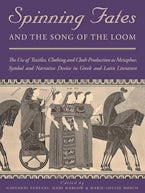The history of the Ancient Near East covers a huge chronological frame, from the first pictographic texts of the late 4th millennium to the conquest of Alexander the Great in 333 BC. During these millennia, different societies developed in a changing landscape where sheep (and their wool) always played an important economic role. The 22 papers presented here explore the place of wool in the ancient economy of the region, where large-scale textile production began during the second half of the 3rd millennium. By placing emphasis on the development of multi-disciplinary methodologies, experimentation and use of archaeological evidence combined with ancient textual sources, the wide-ranging contributions explore a number of key themes. These include: the first uses of wool in textile manufacture and organization of weaving; trade and exchange; the role of wool in institutionalized economies; and the reconstruction of the processes that led to this first form of industry in Antiquity. The numerous archaeological and written sources provide an enormous amount of data on wool, textile crafts, and clothing and these inter-disciplinary studies are beginning to present a comprehensive picture of the economic and cultural impact of woollen textiles and textile manufacturing on formative ancient societies.
Foreword and Acknowledgements
Wool Economy in the Ancient Near East and the Aegean
by Catherine Breniquet and Cécile Michel
1 Bronze and Iron Age Wools from Europe
by Antoinette Rast-Eicher
2 The Expansion of Sheep Herding and the Development of Wool Production in the Ancient Near East: An Archaeozoological and Iconographical Approach
by Emmanuelle Vila and Daniel Helmer
3 Sheep, Wool and Textile Production, an Interdisciplinary Approach on the Complexity of Wool Working
by Eva Andersson Strand
4 The Archaeology of Wool in Early Mesopotamia: Sources, Methods, Perspectives
by Catherine Breniquet
5 Lambs of the Gods. The Beginnings of the Wool Economy in Proto-Cuneiform Texts
by Petr Charvat
6 The value of Wool in Early Bronze Age Mesopotamia. On the Control of Sheep and the Handling of Wool in the Presargonic to the Ur III Periods (c. 2400 to 2000 BC)
by Walther Sallaberger
7 Wool in the Economy of Sargonic Mesopotamia
by Benjamin Foster
8 From Weighing Wool to Weaving Tools. Textile Manufacture at Ebla during the Early Syrian Period in the Light of Archeaological Evidence
by Luca Peyronel
9 Rations of Wool at Ebla (Syria, XXIVth cent. BCE)
by Maria Giovanna Biga
10 Making Textiles at Arslantepe, Turkey, in the 4th and 3rd Millennia BC. Archaeological Data and Experimental Archaeology
by Romina Laurito, Cristina Lemorini and Assunta Perilli
11 Wool Economy in the Royal Archive of Mari during the Šakkanakku Period
by Laurent Colonna d’Istria
12 All Wool and a Yard Wide. Wool Production and Trade in the Old Babylonian Sippar
by Katrien de Graef
13 Wool Trade in Upper Mesopotamia and Syria According to Old Babylonian and Old Assyrian Texts
by Cécile Michel
14 Wool in Anatolia in the Old Assyrian Period
by Agnete Wisti Lassen
15 Wool Economy in Minoan Crete before Linear B. A Minimalist Position
by Pietro Militello
16 Wool in the Nuzi Texts
by Philippe Abrahami
17 Wool Production and Economy at Ugarit
by Valérie Matoïan and Juan-Pablo Vita, with a contribution of E. Bordreuil
18 Sheep Rearing, Wool Production and Management in Mycenaean Written Documents
by Françoise Rougemont
19 Wool Economy in Greece, end of IInd millennium and Ist millennium BC
by Marie-Louise Nosch
20 Wool, Hair and Textiles in Assyria
by Nicholas Postgate
21 “If you have a sheep, you have all you need”. Sheep Husbandry and Wool in the Economy of the Neo-Babylonian Ebabbar Temple at Sippar
by Stefan Zawadzki
22 Fabrics and Clothes from Mesopotamia during the Achaemenid and Seleucid Periods: the Textual References
by Francis Joannès











